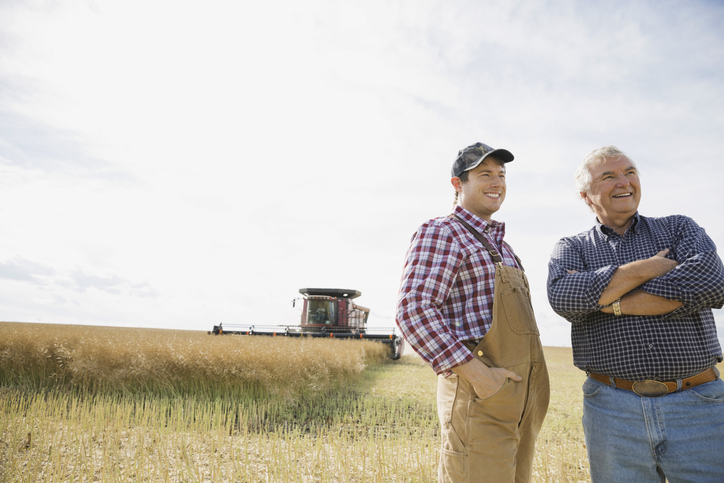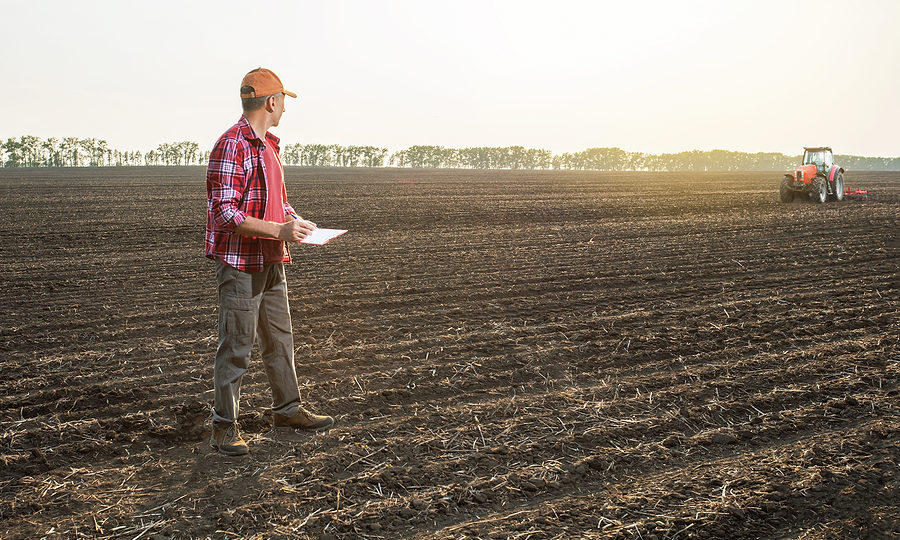-
Do Farmers Pay Taxes? The Basic Tax Obligations of Farming
- Jul 10, 2023
- By Genske, Mulder & Company
- In Uncategorized
- Comments Off on Do Farmers Pay Taxes? The Basic Tax Obligations of Farming
If you raise crops or livestock for profit, and the money you make is more than just a side income, then IRS considers your farm to be a business. In this article, we’ll explore the various taxes farmers need to consider. By understanding these tax requirements, farmers can stay compliant with government regulations while optimizing their financial strategies.
Business Income Tax
One of the primary taxes that farmers must pay is the business income tax. Farm income is reported on the personal income tax return, and farmers must track their sales of livestock, produce, grains, and other products.
Employment Taxes
If farmers hire workers for their farming operations, they are responsible for paying employment taxes. These taxes include federal income tax withholdings, Social Security tax, Medicare tax, and possibly federal unemployment tax. Farmers must withhold and pay these taxes on behalf of their employees, along with their share of FICA taxes.
Sales Tax
In most states, a state sales tax applies to various transactions, including farming. While some farming income may be exempt from sales tax, farmers must know the specific rules and exemptions that apply to their state.
Property Tax
Business farm property is subject to property tax, including real property such as land and buildings and personal property used for farming operations. Farmers must account for property tax when planning their farm expenses and should consult their local tax authorities for specific rates and assessments.
Use Taxes
Use taxes are applicable when sales tax does not apply. This tax is levied on goods and taxable services purchased for use, storage, or consumption in the state. Farmers should be aware of these taxes, especially if they purchase equipment or supplies from out-of-state sellers who did not collect sales tax.
Gift Taxes
Farmers should also be aware of gift taxes if they transfer property to someone else while receiving nothing or less than its total value in return. While certain exemptions apply, farmers should consult the IRS guidelines and determine if they need to file a Gift Tax return.
Self-Employment Taxes
Since farmers are considered self-employed, they are responsible for paying self-employment taxes. This includes both the employer and employee shares of the tax. Farmers can deduct farm expenses to reduce their tax liability, which is especially beneficial during periods of low or no income.
Need Help with Your Farm Tax Obligations?
Farmers, as business owners, have tax obligations that they must fulfill. To stay compliant, farmers must navigate various tax types, from business income tax to employment taxes, sales tax, property tax, and more. By specializing in tax preparation and planning, our tax professionals at Genske, Mulder & Company, LLP ensure that your tax strategies are optimized to minimize liabilities and maximize savings on your farm. Contact us today to learn more.
-
Breaking Down the Different Types of Farm Budgets to Make Informed Decisions
- Jul 10, 2023
- By Genske, Mulder & Company
- In Uncategorized
- Comments Off on Breaking Down the Different Types of Farm Budgets to Make Informed Decisions
Farm budgets are a fundamental aspect of farm management that involves allocating resources and making informed decisions regarding using those resources. It is a process of numerical calculations that assists farm managers in making management decisions. Farm budgets play a crucial role in ensuring a farm operation’s financial viability and sustainability.
The Importance of Farm Budgeting
Farm management is a complex process that requires a combination of skills and knowledge for financial success. Budgeting serves as a critical component in this process, providing the following benefits:
1. Resource Optimization: Farm managers can determine the most efficient use of available resources by creating a budget. This includes deciding which enterprises to pursue, how much land to allocate to each, what equipment is needed, and which production practices to employ.
2. Goal Alignment: Budgeting allows farm managers to ensure that the farm’s plans and actions align with the overall goals and objectives of the farm family. It helps reduce conflicts and maximizes the utilization of family-controlled resources.
3. Profitability Analysis: Farm managers can assess the profitability of different enterprises or production practices through budgeting. By identifying costs, revenues, and expected returns, they can make informed decisions to maximize profits.
4. Risk Management: Budgeting helps farmers evaluate potential risks and uncertainties associated with different production activities. Farmers can develop contingency plans and make proactive decisions to mitigate risks by considering various scenarios.
5. Tax Planning: A well-structured budget can help farm managers effectively plan for taxes. Farmers can optimize their tax strategies and minimize the tax burden by understanding the financial implications of their operations.
Whole-Farm Budgeting
The whole-farm budget is a comprehensive and detailed summary of the entire farm business’s significant physical and financial features. It provides an overview of all the components of the farm business and establishes the relationships among these different parts. A whole-farm budget aims to identify the resources available for use in production, determine the expected costs and returns, and align them with the goals and objectives of the farm family.
Creating a whole-farm budget involves listing the goals and objectives of the farm firm, inventorying the available resources, determining the expected production data, and identifying reliable input and output prices. By integrating the goals and objectives of the farm with those of the family, whole-farm budgeting ensures a holistic approach to farm management.
Partial Farm Budgeting
Partial farm budgeting is a budgeting method that analyzes the effects of a change from an existing plan. Unlike whole-farm budgeting, partial-farm budgeting focuses only on revenue and expense items that will change with a defined change in the plan. By considering the specific impacts of the shift, partial farm budgeting allows farm managers to determine whether the proposed change will improve or hinder the overall farm budget.
Applying partial farm budgeting involves systematically listing receipts and expenses that will increase or decrease with the proposed change. This method helps fine-tune the total farm budget and provides a clearer understanding of the potential economic effects of the change. However, it is essential to note that partial farm budgeting does not provide a comprehensive overview of the entire farm business and should be used with other budgeting methods.
Enterprise Budgeting
Enterprise budgeting involves analyzing individual farm enterprises to assess their financial performance. An enterprise can be any specific crop, livestock, or other production activity within a farm operation. Farm managers can understand the profitability and potential risks of different production activities by examining the revenues and expenses associated with each enterprise.
The process of enterprise budgeting includes identifying individual enterprises within the farm operation, calculating the revenues and expenses specific to each enterprise, and analyzing the profit potential. This analysis allows farm managers to make informed decisions about resource allocation and determine which enterprises are the most financially viable.
Conclusion
Farm budgeting is a critical aspect of farm management that enables managers to make informed decisions and allocate resources effectively. By understanding the different types of farm budgets, such as whole-farm budgeting, partial-farm budgeting, and enterprise budgeting, farmers can gain insights into the financial health of their farm operations and make strategic decisions. If you have questions about your farm budget, contact us today.
-
Five Strategies for Farm Estate Planning to Secure Your Legacy
- Jul 10, 2023
- By Genske, Mulder & Company
- In Uncategorized
- Comments Off on Five Strategies for Farm Estate Planning to Secure Your Legacy
Farm estate planning is a crucial but often overlooked aspect of ensuring a smooth transition of agricultural assets to future generations. Without proper planning, potential heirs may face significant challenges and financial burdens while jeopardizing the farm’s survival. To navigate this process effectively, it is essential to implement strategic farm estate planning strategies.
1. Business Entity Ownership
Establishing a business entity ownership structure, such as a Limited Liability Company (LLC) or corporation, can effectively manage farm business assets. This approach allows for the gradual increase of successor ownership rights over time while maintaining stability and control in the hands of the active farmer. By doing so, the farm equity management control remains intact while ensuring the equitable distribution of assets among heirs.
2. Buy/Sell Arrangement
A buy/sell arrangement provides a legal framework for the successor to purchase the farm upon specific triggering events, such as severe illness or death. Typically, this arrangement is funded by life insurance policies, which not only facilitate the purchase of the farm at an agreed-upon price but also enable the buyout of non-farm heirs. Utilizing this strategy makes the farm estate planning process more streamlined, ensuring a smooth transition and a secure financial future for the successor.
3. Installment Sale
For farms experiencing rapid growth, an installment sale can effectively freeze the farm’s value while transitioning assets to the successor over time. This approach involves the successor making installment payments based on an agreed-upon timeframe. Besides facilitating a gradual transfer of farm assets, it also helps minimize potential federal estate taxes on future growth. Careful financial planning and consideration are critical when implementing this strategy.
4. Intentionally Defective Grantor Trust (IDGT)
An intentionally defective grantor trust (IDGT) allows the predecessor to transfer farm assets through a trust, effectively freezing their value. Unlike an installment sale, the farm assets are placed in the trust rather than transferred directly to the successor. This strategy enables the predecessor to retain greater asset control while ensuring a smooth ownership transition. However, seeking guidance from a knowledgeable attorney is essential due to the complexity involved.
5. Inheritance Offset
The inheritance offset strategy allows the predecessor to leave farm assets to the successor while making non-farm heirs beneficiaries of their life insurance policies in equal amounts. This approach ensures that all heirs receive a fair share while preserving the farm’s continuity under the new owner and operator. Proper valuation of farm assets, consultation with legal and tax counsel, and the guidance of a qualified appraiser are essential when implementing such a strategy.
Farm estate planning is vital for farmers who wish to secure their agricultural legacy and ensure a seamless transition to the next generation. However, it is crucial to seek professional guidance and consult with legal and tax experts to ensure the successful implementation of these strategies. Start your farm estate planning journey today by contacting us to help to protect your farming legacy for generations to come.
-
Navigating the Maze of Farm Income Taxes
- Jul 10, 2023
- By Genske, Mulder & Company
- In Uncategorized
- Comments Off on Navigating the Maze of Farm Income Taxes
Farmers, like small business owners, have unique tax considerations essential to understanding. Federal farm income taxes play a crucial role in the financial management of farming operations. In this article, we will delve into the key concepts and applications of farm income taxes, helping farmers navigate their tax liabilities and make informed business decisions.
What Defines a Farmer for Tax Purposes?
Under tax law, a farmer is defined as someone who operates a farming business to make a profit. The IRS considers a farm a business that engages in farming activities and generates income reported on Schedule F (Form 1040), Profit or Loss from Farming. These farming activities typically involve cultivating land and raising or harvesting agricultural or horticultural commodities.
Understanding Farm Income
Farm income encompasses various sources, including selling farm products, income from custom work and farm-related services, distributions from cooperatives, barter income, refunds, and reimbursements. Additionally, most agricultural program payments are taxable and must be included as income on Schedule F.
Deductible Farm Expenses
To offset farm income and determine taxable profit, farmers can deduct eligible farm expenses. Understanding which expenses are deductible is crucial for optimizing tax liabilities. Some common deductible expenses include feed, seed, fertilizer, livestock supplies, maintenance and repairs, farm labor wages, and property taxes.
Record-Keeping for Farm Taxes
Maintaining proper records is essential for fulfilling tax-reporting requirements and facilitating financial management. A comprehensive record-keeping system should organize business transactions, including income sources, deductible expenses, and other items reported on tax returns. Farmers can choose suitable record-keeping systems that align with their operations, but it is advisable to keep supporting documents associated with transactions for at least three years.
Choosing an Accounting Method
Farmers have the flexibility to choose between cash and accrual accounting methods for reporting income and expenses. The cash method records income received and deducts expenses when paid, aligning cash flows with tax liabilities. On the other hand, the accrual method recognizes income when earned and expenses when incurred, providing a more accurate assessment of profit. Understanding the implications of each accounting method is crucial when filing taxes.
Special Considerations for Hobby Farmers
Hobby farming refers to activities primarily done for fun or recreation without the intent of making a profit. Income from hobby farming is reported as “Other income” on Form 1040, and deductions can only be taken on Schedule A, subject to IRS limitations. The IRS presumes an activity to be conducted for profit if it produced a profit in at least three of the past five tax years.
Expert Guidance Understanding Your Farm Income Taxes
Navigating the complexities of farm income taxes can be daunting. Understanding federal farm income taxes is crucial for farmers to make informed business decisions and manage their tax liabilities effectively. Farmers should seek advice from competent tax advisers who specialize in agricultural taxation. At Genske, Mulder & Company, LLP, our accountants, bookkeepers, and tax professionals can provide valuable insights and ensure compliance with tax laws while optimizing tax strategies. Get started today to see how we can help you Grow and Thrive.
Categories
Categories
- Uncategorized (24)
Iframe Video
Twitter Feed
- Our Twitter feed is currently unavailable but you can visit our official twitter page @ThemeForest.




